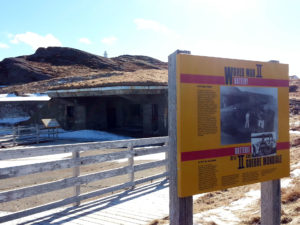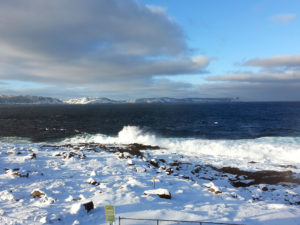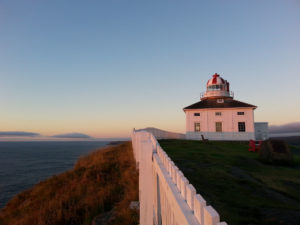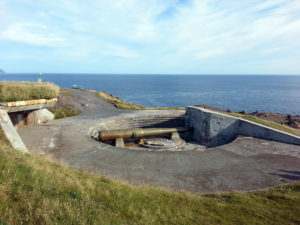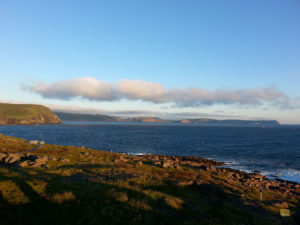For years now I’ve been trying to make sense of the closing quote on the information ‘Flat Board’ located at Cape Spear, Newfoundland’s WW2 gun battery.
I can only assume that it reads as a warning or perhaps consolation to visitors who might spend but a few moments at the site and could experience any variety of weather types – stating simply; “They (the soldiers) left it as they found it – cold, clammy, foggy and miserable.”
Personally, I love visiting the National Historic site at Cape Spear and consider it among my favorite places in the province. From the moment you top the forested ridge of ‘Black Head’ and look down upon the craggy coastline and it’s “Moor” like barrens you are overwhelmed by the spectacle of its natural beauty.
Your first impression is that made by the deeply contrasting colours – the endless sky and the broad North Atlantic bring deep hues of blue to play, while a brilliant white froth paints a broad border that separates the ocean waters from the bright red, conglomerate rock formations that predominate the coast in exclusivity.
Where the ocean ends – the land begins; with a rolling carpet of low lying bushes, grasses, & wild berry plants featuring an earthen palate that is completely devoid of tress – other than the spotting of a few stubborn ‘Tuckamores’ that have curled themselves into a sheltered hollow.
Wildly positioned boulders of enormous girth sit at precarious angles, dropped sporadically across the plain as ‘Erratic’s’ from the melting glacial ice that once covered this land in its entirety. Beautiful hiking trails wind along the water’s coastal reach and intertwine the many wild varieties of natural and manmade features – including two lighthouses (one dating back to 1836) that create a distinctive skyline on the highest points.
It is indeed a marvelous attraction that guests can enjoy regardless of the season – in fact I sometimes think it is preferable to visit in the coldest months of winter. So how could those boys leave such a somber note to greet our guests?
For many years I’ve tried to excuse their bleak assessment by pointing to the poor construction and haphazard design used at the battery site. There were no thermopane windows back in those days, they didn’t have central heating and the open air design that funneled every breath of wind into a drafty breezeway. So I suppose it was clammy!
And as for team spirit all, you have to do is look at the guns to realize how desperate a situation England – and therefore these boys – found themselves when this post was built in 1941.
As another finger board explains, these guns were first used to defend the mouth of the Delaware River in 1896 and so were quite ancient by the time they arrived in Newfoundland.
Though the cannon were capable of lobbing a 500lb shell approximately 8.5 miles – they did so with near zero accuracy and thus made more of a target than a line of defence against the incredibly advanced German Navy .
I don’t suppose they were ever “fired in anger” – would do nothing but draw attention to the post.
“Too foggy to see anything, sir!”
Additionally I like to ask my guests to note their own clothing choices and say “In those times there was no such thing as Gore-Tex or Thinsulate or Scotchlite.” Old canvas jackets, woolen mitts and leather gummed boots were the best protection they had against the weather and thus explains the “cold” they must have often experienced.
As for miserable – well you might note that it wasn’t too long after this that the Americans arrived in Newfoundland enmasse and Cape Spear would enjoy a perfect view of the new army base they built on the fields behind Quid Vidi Lake.
Newfoundlander’s still refer to this as the “friendly invasion” and though there was much evidence of war – from ‘black outs’ to the arrival of damaged ships, hospital visits and the overwhelming sense of our mortality – many “positive” relationships were begun.
So can you imagine being stationed at such a remote location while at the same time living so close to the many parties and good cheer going on across the bay?
Yes I dare say that would have been pure misery.

